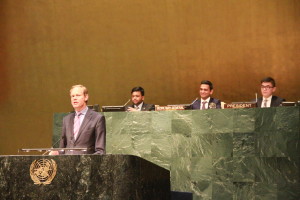
Ambassador Rycroft speaks to NYUMUNC delegates
On Thursday, hundreds of delegates entered the doors of the UN General Assembly to kick off NYUMUNC VII. Over the weekend, the New York University Model United Nations Conference IIV broke boundaries; the conference had the United Kingdom’s Ambassador to the UN as their guest speaker, successfully coordinated twenty JCC committees in historical, contemporary, and future universes, and was the very first conference in Model UN history to have all crisis notes and directives coordinated online.
All of this was possible under the leadership of their Secretary General, Arnav Mody, a senior at New York University, the assistance of NYUMUN’s President, Azizjon Azimi, and the masterminds of Undersecretary Generals of Committees and Crises, Luiza Monetti and Aditya Patwari. Speaking from the United Nations podium, Monetti explained at Opening Ceremonies the grand concept behind the themes of their committees – with historical committees focusing on the imperialist construction of the 1890’s, contemporary committees dealing with the survival of the great European experiment, and the Ad Hoc committee immersed in a future parallel universe. Through a common pattern of conflict and power dynamic, they threaded all three worlds together.
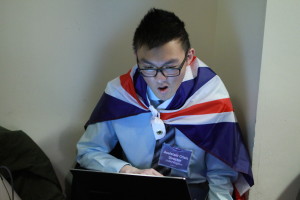
A crisis staffer checks Systems in the back room
Going paper free
It was no doubt that the most revolutionary aspect of NYUMUNC was that all crises were coordinated online on what NYUMUNC named “Systems.” Systems is the brainchild of NYU alumni Jan Biernacki, and was first designed for the Kurdistan Committee at NYUMUNC VI last year. At Model UN conferences, miscellaneous pieces of paper are a common sight, so the idea of a paper-free conference is a daunting one. But NYUMUNC sought to reform the way that crisis works –more efficient, responsive, and faster – all online. This was no easy feat, with putting more than 250 delegates onto the same Wi-Fi portal and attempting to operate twenty different committees without the site crashing.
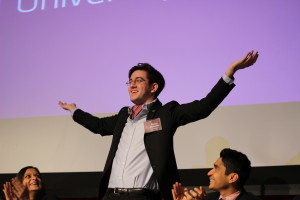
Jan Biernacki, creator of Systems
Undersecretary General of crisis committees, Luiza Monetti, remarked that Systems only furthers crises for delegates. “The fact that we are a joint-crisis conference demands fast crisis responses and allows for more inter-committee interaction, both of which make the simulation feel very organic and real. Not to mention that we went fully electronic this year, which puts an incredible amount of pressure on the crisis staff, as speed and accuracy of crisis responses and updates become even more important.”
Secretary General Mody said that the decision to expand it to all twenty NYUMUNC committees was a difficult one, but they “decided to take that risk go to all systems.” The result? Faster, more interconnected committees with over 80 back-door meetings, over 12,000 crisis notes, and more than 25,000 inter-committee notes.
Returning to MUN’s Roots
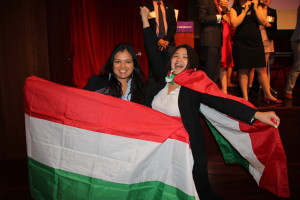
Staffers from the Hungary Committee at Closing
New York University’s recently launched UN Initiative has been able to connect university students with world-renowned leaders through panels, briefings, and one-on-one discussions. When it was timeto plan the Opening Ceremonies for NYUMUNC, President Azimi and Secretary General Mody turned to the existing relationship the school held with the United Nations under their university program: the UN Initiative. Mody remarked that he met the UK Ambassador to the UN, Matthew Rycroft, at a panel discussion NYU’s Model UN program hosted, and he decided to take a chance to land Rycroft as NYUMUNC’s Guest Speaker. Mody managed to not only have Ambassador Rycroft as Guest Speaker, but also was able to host their Opening Ceremonies in the General Assembly of the United Nations. Delegates got to speak with Ambassador Rycroft on important geopolitical issues, like the migrant crisis in Europe and the upcoming election for the United Nations Secretary General. When asked about where he sees this relationship with the United Nations and NYUMUNC going, Mody remarked, “in the future I think we will set up strong relationships. They know that we’ve had so many guests, and now they might want to get on that.”
Three Parallel Universes
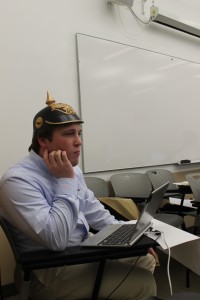
A delegate ponders
The conference showcased three universes – modern, historical, and future – and focused on the viability and sustainability of the fabric of Europe.
The Undersecretary General for crisis committees, Luiza Monetti, claimed “historical presents its own challenges of course: the research is much more in-depth, and we have to allow ourselves greater creative license to fill in the missing holes. And because we wanted to make it even more complicated for some reason, we chose a cross-regional historical universe, with both European and African countries. Though the experience was illuminating to understand imperialist Europe and colonial Africa, it mainly served to draw parallels between misconceptions of an ‘African identity’ and a ‘European identity’… we wanted to point out that the status quo isn’t as self-evident or permanent a state as we may sometimes believe.”
The historical JCC’s showcased historical Belgium, Britain, German Empire, French Republic, Kingdom of Italy, Congo Free State, German South West Colony, South African Republic, Senegal, and the Ethiopian Empire. In the contemporary JCC, committees of Hungary, Ukraine, Russia, France, the Italy, Spain, and Greece, delegates pondered the stability of the great European experiment: the European Union. Ad Hoc was the futuristic committee that took place in an alternate universe in space, where delegates overthrew galaxies and built constellations.
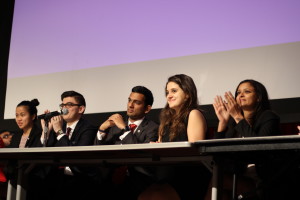
The Secretariat looks on at Closing
But what NYUMUNC Secretariat and Staff take pride in not the devious crisis arcs they strategize months before, but rather the degree of realism they inject into committees by predicting future crises.
“Every year we’ve been enhancing the realism we deliver to crisis. Besides the parallel universe, we try and mirror what would happen in the real world. How often we predict actual things will happen – Boko Haram, we predicted, the South China Sea Crisis, we predicted – so it’s just cool a year or two after to see how relevant these crises we created are. I think – although MUN now has deviated from the UN – that’s a common trend. I think we can still keep it close in mirroring the purpose and realism it has.” – Secretary General Arnav Mody
Congratulations to the delegations that won awards!
Best Large Delegation: Harvard University
Outstanding Large Delegation: Georgetown University
Best Small Delegation: Columbia University
Outstanding Small Delegation: George Washington University

